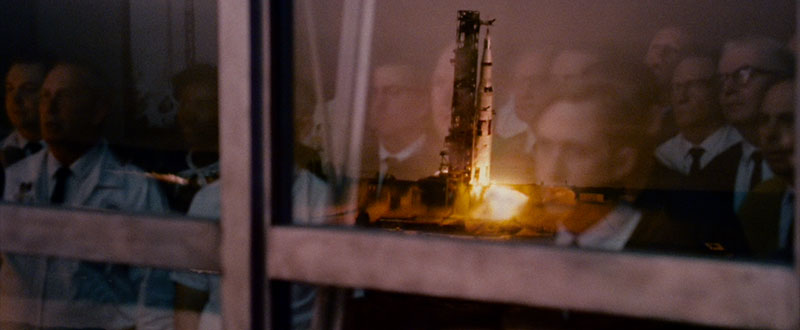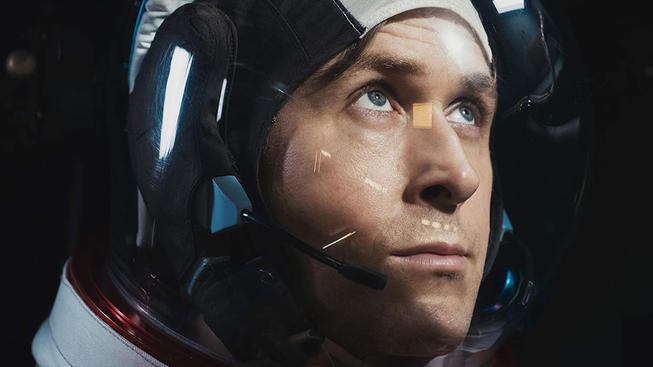First Man (2018)
CAST: Ryan Gosling, Claire Foy, Kyle Chandler, Jason Clarke, Corey Stoll, Ciaran Hinds, Lukas Haas, Shea Whigham, Cory Michael Smith, Patrick Fugit, Pablo Schreiber, Ethan Embry, Brian d’Arcy James
REVIEW:
First Man would make an excellent companion piece to other docudramas about the 1960s NASA space program, including 1995’s Apollo 13 (whose mission took place only nine months after the climax of this film) and 1983’s sprawling The Right Stuff, which some consider definitive (although it portrays an earlier phase of the space race than First Man and Apollo 13, meaning one could watch the three as a sort of loosely-connected trilogy). The primary difference is that, while those films were ensemble casts giving a broader overview of the workings of NASA, both on Earth and in space, First Man is more tightly-focused on the professional and personal life of the first man on the moon, Neil Armstrong, offering an intimate look at a man who sometimes seemed as remote as the bleak, barren lunar surface.
First Man follows the development of the NASA space program from 1962 to 1969 as seen through the eyes of test pilot and engineer Neil Armstrong (Ryan Gosling). The road to destiny is fraught with losses and setbacks. Early on, Armstrong loses his young daughter to a brain tumor. Later, several fellow astronauts, including his good friend Ed White (Jason Clarke), are killed in a grisly pre-launch accident. Through it all, the stoic Armstrong soldiers on, but the same inscrutably unflappable demeanor that makes him an asset to his superiors leads to an increasingly strained marriage with his frustrated wife (Claire Foy). Finally, on July 20, 1969, Armstrong and fellow astronauts Buzz Aldrin (Corey Stoll) and Michael Collins (Lukas Haas) make the fateful launch that will lead Armstrong to take his iconic “one small step for man, one giant leap for mankind”.
First Man attempts to balance both the epic and the intimate, and the professional and personal, but the balance is occasionally a little uneven. Damien Chazelle indulges in the shaky-cam effect, which is excusable in the scenes depicting a rattling module cockpit but is occasionally a little distracting during low-key office or domestic scenes. The intention is to add a “you are there” immediacy, but to me it has the opposite effect of interfering with immersion and reminding us we’re in a movie (the way Chazelle has chosen to film First Man is similar to Michael Mann’s controversial approach with Public Enemies). This sometimes contributes to an emotional remoteness in the scenes depicting Armstrong’s family relationships (though one could argue it accentuates the remoteness already stemming from Armstrong’s demeanor). When it comes to Armstrong, it’s a warts-and-all portrayal. One is left with a respect for his passion and drive and his dauntlessness, while the movie doesn’t shy away from his shortcomings as a sometimes emotionally unavailable husband and father. The secondary supporting roles are not well-identified; various NASA figures flicker across the screen, but we don’t know who they are (for example, you’d have to read the cast list to realize that Pablo Schreiber’s character is Jim Lovell, whom Tom Hanks played in Apollo 13).
 Like Apollo 13, First Man shows impeccable docudrama technical attention to detail. The film opens with a jarringly intense sequence of Armstrong plummeting through the atmosphere (“let’s go again” is his characteristically matter-of-fact first sentence upon surviving an emergency landing), and later scenes bring across in sometimes uncomfortably visceral detail how cramped and claustrophobic the lunar modules were, and the teeth-rattling intensity of a pod spinning out of control (in one grippingly intense sequence, Armstrong has an estimated forty seconds to regain control and slow his roll before losing consciousness). As in Apollo 13, these scenes sometimes have the striking effect of reminding us that these astronauts made the journey to the moon with technology that seems archaic and primitive by today’s standards, as well as conveying unflinchingly the high cost that paved the road; the reenactment of the pre-launch electrical fire that killed Ed White, Gus Grissom (Shea Whigham), and Roger Chaffee (Cory Michael Smith) is disturbing without becoming gratuitously graphic, and we’re also given the sobering factoid that Armstrong and Aldrin’s NASA superiors already had a public statement written and ready to be delivered to the press in the event of their deaths. There is not an overabundance of special effects—in fact, they’re few and far between—-but what there is blends in with perfect verisimilitude. Even in Armstrong’s earlier launches, the camera generally stays tightly-focused within the pod, showing the experience through Armstrong’s limited perspective and saving the big moments of grandeur for the climax, when the shuttle takes off and Armstrong finally stands on the lunar surface. The visual razzle dazzle is limited to what’s necessary for the story and as such is effective and strategically-placed without ever seeming gratuitous or overdone.
Like Apollo 13, First Man shows impeccable docudrama technical attention to detail. The film opens with a jarringly intense sequence of Armstrong plummeting through the atmosphere (“let’s go again” is his characteristically matter-of-fact first sentence upon surviving an emergency landing), and later scenes bring across in sometimes uncomfortably visceral detail how cramped and claustrophobic the lunar modules were, and the teeth-rattling intensity of a pod spinning out of control (in one grippingly intense sequence, Armstrong has an estimated forty seconds to regain control and slow his roll before losing consciousness). As in Apollo 13, these scenes sometimes have the striking effect of reminding us that these astronauts made the journey to the moon with technology that seems archaic and primitive by today’s standards, as well as conveying unflinchingly the high cost that paved the road; the reenactment of the pre-launch electrical fire that killed Ed White, Gus Grissom (Shea Whigham), and Roger Chaffee (Cory Michael Smith) is disturbing without becoming gratuitously graphic, and we’re also given the sobering factoid that Armstrong and Aldrin’s NASA superiors already had a public statement written and ready to be delivered to the press in the event of their deaths. There is not an overabundance of special effects—in fact, they’re few and far between—-but what there is blends in with perfect verisimilitude. Even in Armstrong’s earlier launches, the camera generally stays tightly-focused within the pod, showing the experience through Armstrong’s limited perspective and saving the big moments of grandeur for the climax, when the shuttle takes off and Armstrong finally stands on the lunar surface. The visual razzle dazzle is limited to what’s necessary for the story and as such is effective and strategically-placed without ever seeming gratuitous or overdone.
Ryan Gosling (reunited with Chazelle from La La Land) is effective as Armstrong; it’s not a particularly charismatic or dynamic performance, but that’s not what the character calls for. Gosling plays Armstrong as a repressed, taciturn, stoic figure (by all accounts an accurate portrayal) who approaches his young daughter’s cancer treatments with the same analytical notes as plotting orbits and flight plans and is not given to outward displays of emotion (he has a private moment where he breaks down sobbing after his daughter’s funeral, but is unwilling or unable to open up emotionally to other people, including his wife). His delivery of Armstrong’s iconic line “that’s one small step for man, one giant leap for mankind” is so uncanny as to be virtually indistinguishable from the real recording we all know. Gosling’s intentionally aloof performance mostly leaves the emotional displays to Claire Foy, far removed from her young Queen Elizabeth on The Crown with short black hair and an American accent, who plays a second strong-willed wife to follow up co-starring with Andrew Garfield’s Robin Cavendish in last year’s Breathe. Janet Armstrong has a limit to which she is willing to play the dutiful supportive wife; her “for your consideration” potential Oscar clip moment comes before her husband departs for his mission to the moon, when she browbeats a reluctant Neil into having the sit-down talk with his sons and prepare them for the possibility that he may not return. Supporting roles include Kyle Chandler and Ciaran Hinds as NASA honchos, Jason Clarke as Armstrong’s ill-fated buddy Ed White, and Corey Stoll as Buzz Aldrin, though one might wonder what Aldrin, if he sees this film, will think of the rather unflattering way he’s portrayed here.
First Man stands comfortably alongside The Right Stuff and Apollo 13 as impeccably well-crafted docudramas telling the story of different phases of NASA’s 1960s space program, and joins them as an involving drama about one of the most significant human endeavors of the 20th century.
* * *
